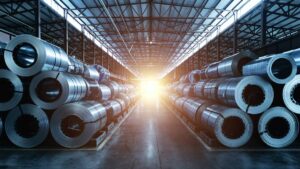Ground Breakers: Whitehaven earnings are… just… staggering

Pic: Selimaksan/E+ via Getty Images
- Whitehaven Coal pulled in a whopping $514/t on its coal sales in the June quarter
- High energy prices have seen Whitehaven’s unaudited EBITDA climb from $200 million in FY21 to $3 billion in FY22
- Coal prices are expected to remain strong as energy security becomes a bigger issue than any time since the 70s oil crisis
The ASX’s most watched pure play coal stockWhitehaven Coal (ASX:WHC) is poised to bag a 15 times rise in earnings for FY22 to $3 billion as coal prices exploded in the June quarter.
Whitehaven charged through the June quarter, upping ROM coal production by 21% to 6.36Mt, saleable coal production by 12% to 5.066Mt and managed coal sales by 19% to 5.543Mt quarter on quarter to hit financial year guidance with 20Mt of ROM production and 17.6Mt of managed coal sales at unit costs of US$84/t.
But it is the prices Whitehaven pulled that really made its quarterly results stand out today, sending the New South Wales thermal coal producer’s shares soaring.
Whitehaven raked in $514/t on average in the three months to June 30, US$370/t for thermal coal, 84% of its sales mix, and US$334/t for metallurgical coal.
That’s a mere 63% up on the previous quarter and 321% than June 2021. As Rove McManus would say, “What The?!”
(Also say hi to your mum for me, less applicable in this sitch.)
More than 90% was premium high energy thermal coal rating 5850kcal or above, which is picking up strong demand from markets like Japan and Korea.
Subject to a final audit WHC expects to pull $3 billi in EBITDA and a billi in net cash after raking in $1.4 billion in the June quarter alone and spending $326.6m on shares buying back 7% of its share capital from investors. Franked dividends and more buybacks are on the cards for its final results in August.
Just how long can these prices go on for, especially with the thermal coal prices at an unusual US$150/t premium to coking coal prices?
How long is a piece of string, really?
With very little energy coal available for purchase in the uncontracted market right now, Whitehaven expects prices to remain strong in 2022 and 2023.
CFO Kevin Ball told analysts on a conference call the world was looking at an energy security crisis in the wake of the Russian invasion of Ukraine unlike any seen since the 1970s.
That took around five years to unwind, with shortages of gas, oil and coal sounding an alarm on high energy prices for the foreseeable future.
“It’s difficult to see alternative forms of energy coming into the market without certainty of offtake and certainty of price,” he said.
One move which could alter the dynamics of the coal market could be the resumption of trade between Australia and China, amid reports that China is looking to thaw relations between the two countries and accept cargos from Australia’s east coast.
That is expected to provide some support to falling coking coal prices, with Chinese steel mills likely keen to get their hands on high quality met coal currently trading at around US$250/t, a big discount to Chinese and Russian prices.
Whitehaven MD Paul Flynn said the resumption of the trade link would have little impact on the $5.7 billion ASX 200 miner.
“Generally it didn’t bother us too much at all that restriction, it’s really the 5500 people (lower energy coal) that bore the brunt of that,” he said.
“I think everyone looks at what’s going on with Russia and says, well China’s going to help them out – well Russia has reasonable quality coal so that doesn’t really answer all of China’s needs.
“China does need to have more of that 5500 so I suspect there may be a benefit for them out of that and probably the loser, if you like out, of that would probably be Indonesia.
“But the world is short of energy as Kevin’s just highlighted to you and as you all knew. And so I’m not expecting too many challenges to come from that.”
Queensland royalties hurt investment case
With a major cash build, Whitehaven is taking a close look at a series of mine expansions and developments frustrated by legal and environmental challenges as well as what was until the last 12 months a pretty dour market for coal.
They include the heavily contested Narrabri Stage 3 expansion project and Vickery extension in New South Wales and the Winchester South metallurgical coal mine near Moranbah in the Bowen Basin, which could produce 15Mtpa over a period of 30 years.
Flynn says recent changes to Queensland’s royalty scheme, which include a top rate of 40% of revenue on coal sales beyond $300/t, could hurt investments in the State’s mining industry.
“It’s quite dramatic, as I say it’s not with consultation. And (it’s) not just a small adjustment, but a material adjustment,” he said.
“Now, when you come back and have a look at it, we haven’t been using a price deck which contemplated the upper ends of the scale they’re taxing now.
“So in that sense it’s not a material effect on our proposition as far as Winchester South goes, but … in this industry, you need those spikes to capture a lot of value in a cyclical business.
“And if the Queensland Government is taking part of that top side away from you, then obviously people are going to look differently in terms of how they rate that region as being prospective for further investment.”
While ESG pressure from investors, coal blacklisting by banks and government imposed emissions reduction have put pressure on funding major projects in recent years, Flynn says energy security concerns could soften attitudes towards supporting the industry.
“The sentiment has certainly moved. I have to say now, no one’s forgetting the commitments that each country has made,” he said.
“But I think everyone’s looking at this and saying, well … put another way, look how fragile our energy system is when you have changes in the marketplace.
“Obviously no one expected Russia to start a war with Ukraine. That’s a terrible thing to do but it’s obviously sent ripples right around the world in terms of the finely balanced nature of our energy systems more generally be that gas, oil, coal, you name it the whole lot.
“At the same time, obviously, the world has been incentivising intermittent sources of energy into the system with the hope that will do the same thing as baseload infrastructure does, which it doesn’t. And so everyone’s looking at that going, well, what do we do about that?
“So I suspect energy security will be rerated as a priority, (in) certainly necessary jurisdictions such as Europe, and it’ll just be something which people knew before was important, but will have to reassess in terms of priorities.”
Coal miners share prices today:
UNLOCK INSIGHTS
Discover the untold stories of emerging ASX stocks.
Daily news and expert analysis, it's free to subscribe.
By proceeding, you confirm you understand that we handle personal information in accordance with our Privacy Policy.








